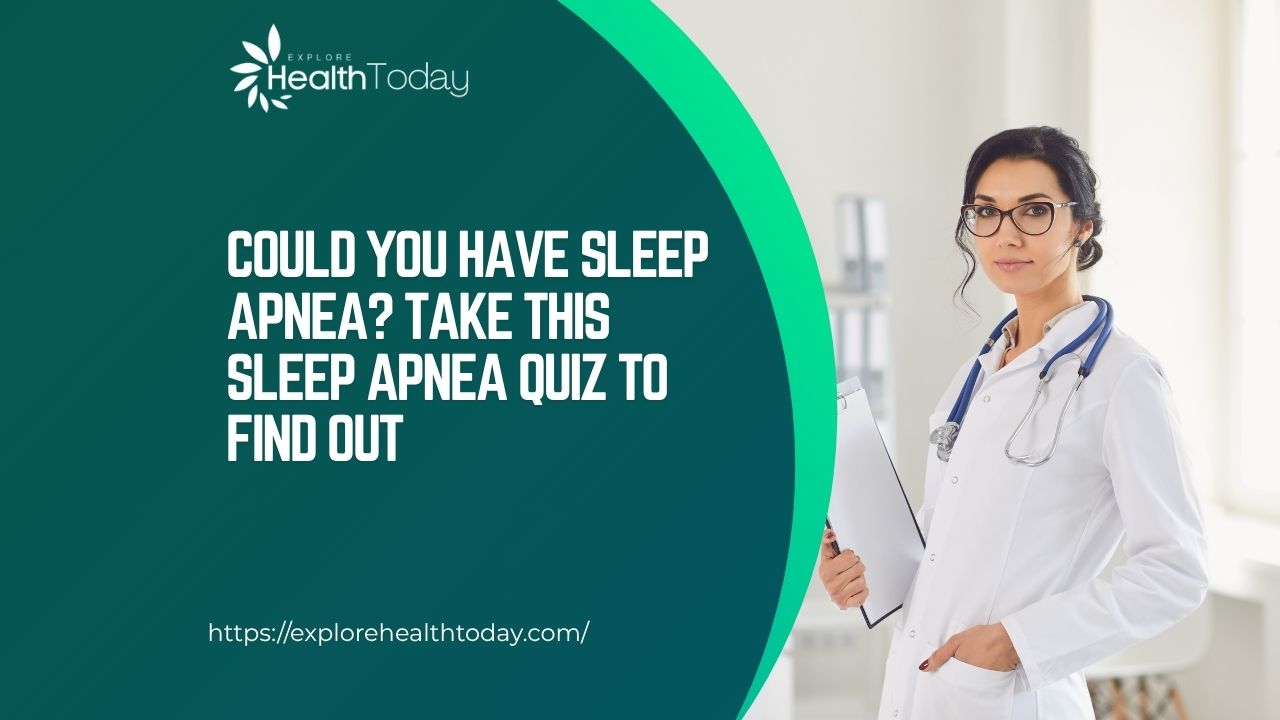If you often wake up feeling tired, have trouble concentrating during the day, or your partner complains about your loud snoring, you might be experiencing more than just poor sleep. Sleep apnea is a serious, yet commonly undiagnosed condition affecting millions of Americans. Thankfully, there’s an easy way to begin understanding your risk—by taking a sleep apnea quiz.
In this guide, we’ll walk you through what sleep apnea is, how to recognize the symptoms, and offer a quick screening quiz to help you evaluate whether it’s time to speak with a healthcare provider.
What Is Sleep Apnea?
Sleep apnea is a sleep disorder in which breathing repeatedly stops and starts throughout the night. These interruptions can lead to poor sleep quality and serious health risks over time.
There are three main types:
- Obstructive Sleep Apnea (OSA): The most common type, caused by airway blockage.
- Central Sleep Apnea: Where the brain fails to send proper signals to breathing muscles.
- Complex Sleep Apnea Syndrome: A combination of both OSA and central sleep apnea.
According to the American Academy of Sleep Medicine, nearly 30 million U.S. adults suffer from sleep apnea, but only about 6 million are diagnosed.
Why Take a Sleep Apnea Quiz?
A sleep apnea quiz can be a helpful first step if you suspect you may have this condition. It won’t diagnose you, but it can highlight red flags that warrant further evaluation by a medical professional.
By identifying your risk early, you can:
- Prevent complications like high blood pressure, stroke, and heart disease.
- Improve your daytime energy and focus.
- Potentially reduce the need for certain medications.
- Sleep better—and let your partner sleep better too.
Take the Sleep Apnea Quiz
Answer the following questions honestly. Keep track of how many “Yes” answers you have.
Sleep Apnea Risk Screening Quiz
- Do you snore loudly (louder than talking or loud enough to be heard through closed doors)?
- Do you often feel tired, fatigued, or sleepy during the daytime?
- Has anyone observed you stop breathing during your sleep?
- Do you have or are you being treated for high blood pressure?
- Is your BMI over 30?
- Are you over the age of 50?
- Is your neck circumference greater than 16 inches (women) or 17 inches (men)?
- Are you male or assigned male at birth?
Scoring:
- 0–2 Yes Answers: Low risk of sleep apnea
- 3–4 Yes Answers: Moderate risk — consider discussing with your doctor
- 5 or more Yes Answers: High risk — strongly recommended to seek medical evaluation
This quiz is based on the STOP-BANG questionnaire, a widely used screening tool for obstructive sleep apnea. Learn more from the National Library of Medicine.
Common Symptoms to Watch For
Even if your quiz score is low, it’s helpful to know the symptoms of sleep apnea. These can include:
- Loud snoring
- Gasping for air during sleep
- Waking up with a dry mouth or sore throat
- Morning headaches
- Trouble staying asleep (insomnia)
- Difficulty focusing or irritability
Not everyone with sleep apnea snores, and not all snorers have sleep apnea—which is why tools like the quiz are only a starting point.
Why Sleep Apnea Is a Growing Concern in the U.S. (2024–2025)
Sleep apnea is gaining more attention due to its connection to chronic health conditions. According to the CDC, untreated sleep apnea is linked to increased risk of:
- Type 2 diabetes
- Heart attack
- Stroke
- Motor vehicle accidents due to drowsy driving
As of 2025, many insurance providers in the U.S., including Medicare, now require documentation of a sleep study before covering CPAP machines or oral appliances. This makes early screening and diagnosis more critical than ever.
What to Do If Your Quiz Suggests You May Have Sleep Apnea
If your quiz score suggests moderate to high risk, your next step should be talking to your healthcare provider. They may recommend:
- A home sleep apnea test (HSAT)
- An overnight polysomnography at a sleep center
- A referral to a sleep specialist
Early intervention can help prevent complications. Most people respond well to treatments like:
- CPAP (Continuous Positive Airway Pressure) machines
- Oral appliances
- Weight loss and lifestyle changes
- Surgery (in select cases)
Learn more about treatment options from the American Sleep Apnea Association.
Who’s at Higher Risk?
You may be at increased risk if you:
- Are over age 40
- Have a family history of sleep apnea
- Are overweight or obese
- Use alcohol or sedatives
- Have a large neck circumference
- Smoke regularly
According to a 2024 report by the National Institutes of Health (NIH), untreated sleep apnea is especially dangerous for individuals with cardiovascular risk factors.
Don’t Ignore the Signs—Get Evaluated
Sleep apnea can seem like a minor inconvenience—just snoring, right? But it’s far more than that. It’s a condition that silently impacts your heart, brain, and overall well-being. The good news is, it’s treatable.
Taking a sleep apnea quiz is a proactive way to assess your risk. If the results concern you, don’t hesitate to speak with your doctor. Early diagnosis and treatment can dramatically improve your quality of life.
Take the sleep apnea quiz above and share your results with your doctor. If you’re at moderate or high risk, consider scheduling a sleep study. Getting the help you need can transform your sleep—and your life.
About ExploreHealthToday.com
ExploreHealthToday.com was created to be a one-stop resource where readers can find up-to-date, well-researched articles on a variety of health topics. From nutrition and wellness to lifestyle and mental health, we strive to provide reliable information to help you make informed decisions about your well-being.
We believe that good health starts with good information, and our mission is to empower our readers with knowledge they can trust.
Visit us at ExploreHealthToday.com to learn more.
